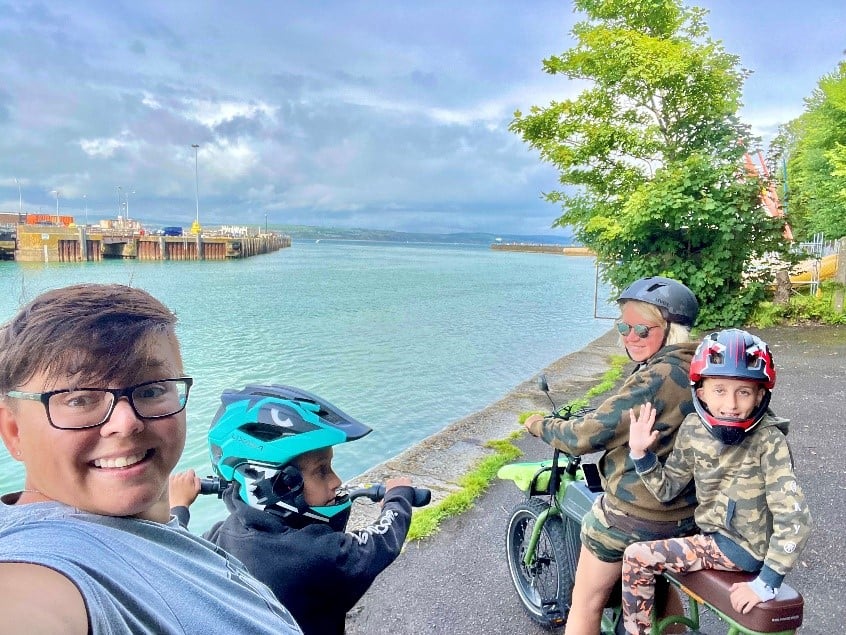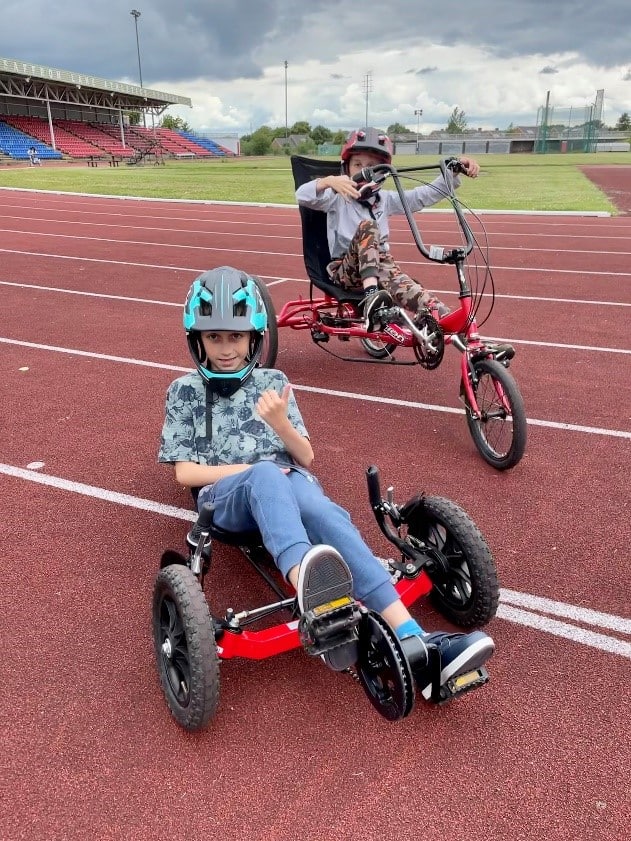Marie Bassford (pictured below wearing helmet and sunglasses) is a researcher at De Monfort University in Leicester. She is currently working with Wheels for Wellbeing on a research project exploring the experiences of autistic children and cycling. In this blog she tells us how learning to cycle with her autistic twin boys got her interested in inclusive cycling and inspired her research project.

“Learning to ride a cycle as a child is an exciting time that most parents and children look forward to. A new skill that promises lots of fresh air, exercise, fun and freedom! As parents of autistic twins, we too were excited but also mindful of the challenges our boys face each day. Autism is a lifelong developmental disability which not only affects how people communicate and interact with the world but can also lead to a number of physical and sensory challenges, including issues with balance and body awareness, or proprioception.
We sat down with the boys and carefully chose bicycles, helmets, knee and elbow protection in their favourite colours. The sun was shining, so we set off to a very flat, quiet, unused road.
The first thing we noticed was that the boys could only focus on one task at a time. They tried and tried to turn the pedals with their feet and struggled to sit their feet on the pedals. The action of lifting and lowering their legs seemed alien to them and they quickly became frustrated.
Not wanting the boys to become disheartened we gently pushed the bikes to let them experience the motion. Oh, how we enjoyed the exercise on that hot sunny day! We next moved our focus to steering noticed that this too was a challenge, with a delay in processing how to turn the handlebars. But it was still fun and we decided to try again the following day. As each day passed we noticed that they improved with the pedalling, but only if the road was either completely flat or sloping downwards. They could not generate enough force to climb even the slightest of inclines, and the boys could not operate the brakes. Grasping the handlebars and squeezing was beyond their strength capabilities and so, although they could gently propel themselves forwards (or sometimes backwards by mistake), they could not steer well enough to avoid curbs or walls, and certainly could not stop if needed.
We went back to the drawing board and realised we needed to consider some different options! We visited Leicester wheels for All and had a blast trying out trikes and recumbent bikes. Interestingly the boys got on well on the latter as it was easier for them to generate the force with their legs. Steering and braking was another issue, but with time and practice we think they could certainly improve. You see, the thing we’ve noticed about autism is that

there are struggles and delays in ways we could not have imagined, but with care and love and patience, nothing is impossible. The recently created Maori word for autism is “Takiwatanga” which means “in their own time and space”. This perfectly sums it up and is the basis for research I am now doing at De Montfort University into the experiences of autistic children learning to cycle. As a family we have explored e-bikes and carrying the boys as pillion passengers to provide the exhilaration and thrill of being on a bike and we will continue to explore adaptations and alternatives to traditional bicycles. We know that like everything else, the boys will get there in their own space and time.
I would love to hear about other autistic children’s experiences of learning how to cycle for my research. The more we understand, the more we can do to improve opportunities, access and motivation for autistic children to engage in cycling. If you are autistic and aged between 12 and 16 years old or have a child who is autistic and in this age range, please complete this short survey and share your experiences: https://forms.office.com/r/bRTKYArEbJ
Thank you and happy cycling!”
You can contact Marie for more information about her research at mbassford@dmu.ac.uk
